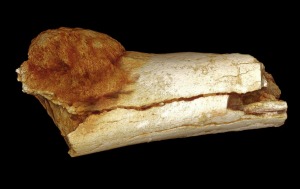We’ve all heard of Boolean logic at some point in our careers whether it be during a consultation with an MSK Informationist (or other librarian), or in a more formal training setting during a survey college course. Whether we use the AND, OR, and NOT operators during simple and complex database searching is a different story. Take a look at the following examples for tips on effectively using Boolean operators.
Do You Know Scientists have Found Cancer in a Million-Year-Old Fossil?
A team of international researchers in South Africa have identified the earliest known incidences of cancer in the hominin fossil record. Two research articles in the South African Journal of Science describe a malignant osteosarcoma in a foot bone, dated at around 1.7 million years old, and benign neoplasms at nearly 2 million years old in hominin vertebrae. The malignant neoplasia predates the last evidence of the disease by nearly 200,000 years. While modern habits and lifestyles are responsible for many instances of cancer, it is apparent that the disease has been around for longer than we thought.

Drug Adverse Event Searching Made Easier By MEDLINE and EMBASE Indexing
Similar to MEDLINE (PubMed), EMBASE (owned by Elsevier) is a biomedical database that indexes over 8600 journals from around the World and adds controlled vocabulary or index terms to all of its article citations. Unlike MEDLINE, however, EMBASE also indexes conference proceedings from over 5600 conferences and it uses the Emtree thesaurus instead of MeSH (Medical Subject Headings).